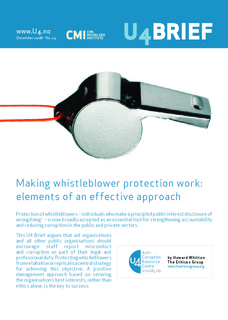| dc.contributor.author | Whitton, Howard | |
| dc.date.accessioned | 2018-01-04T08:15:55Z | |
| dc.date.available | 2018-01-04T08:15:55Z | |
| dc.date.issued | 2008-12-15 | |
| dc.identifier | oai:www.cmi.no:3197 | |
| dc.identifier.citation | Bergen: Chr. Michelsen Institute (U4 Brief 2008:24) 4 p. | |
| dc.identifier.uri | http://hdl.handle.net/11250/2474559 | |
| dc.description.abstract | Protection of whistleblowers – individuals who make a principled public interest disclosure of wrongdoing – is now broadly accepted as an essential tool for strengthening accountability and reducing corruption in the public and private sectors.
This U4 Brief argues that aid organisations and all other public organisations should encourage staff report misconduct and corruption as part of their legal and professional duty. Protecting whistleblowers from retaliation or reprisal is a central strategy for achieving this objective. A positive management approach based on securing the organisation’s best interests, rather than ethics alone, is the key to success. | |
| dc.language.iso | eng | |
| dc.publisher | Chr. Michelsen Institute | |
| dc.relation | U4 Brief | |
| dc.relation | 2008:24 | |
| dc.relation.ispartof | U4 Brief | |
| dc.relation.ispartofseries | U4 Brief 2008:24 | |
| dc.relation.uri | https://www.cmi.no/publications/3197-making-whistleblower-protection-work | |
| dc.subject | Anti-Corruption | |
| dc.subject | Whistleblowing | |
| dc.subject | Ethics | |
| dc.subject | Monitoring Aid | |
| dc.subject | Corruption in Aid | |
| dc.title | Making Whistleblower Protection Work: Elements of an Effective Approach | |
| dc.type | Report | |
